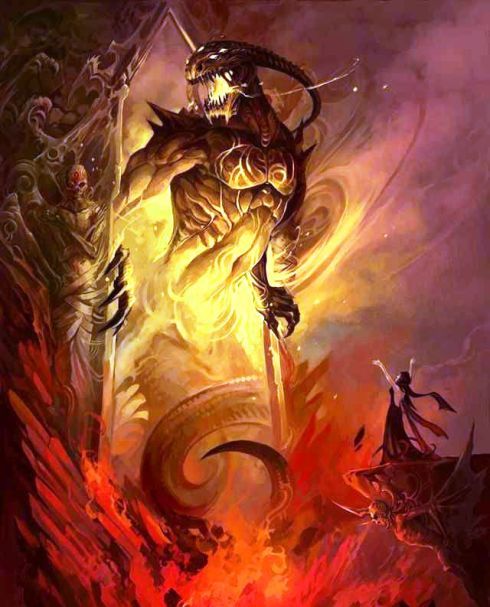Devil
Devils are malicious, sadistic supernatural beings who dwell largely within the Nine Hells, one of the Lower Planes of Existence. They are unlike demons in that they aren't the twisted souls of the damned, but rather creatures who turned against Yahweh and were thence cast out from Heaven. The greatest of their number is named Satan, though he is variously known by other names, such as simply "the Devil," Ahriman, Dispater or Lucifer, though these are but a few.
In this context, the term "devil" predominantly refers to the infernal cohorts of Satan, who were consigned to the depths of hell following their defeat during the War in Heaven. This was a significant event in various religious and mythological narratives, including Christian literature. Satan's minions, often referred to as demons or fallen angels, are condemned to supervise the damned in Hell until the end of time.
Contents
Behaviour
While their designated role in the universe is to inflict suffering and deceive the hapless souls in their care, these genuinely malevolent beings possess a disturbing appetite for their malefic tasks. Still, beyond the confines of Hell, they are perceived as instruments of retribution and divine justice, as those condemned souls who find themselves in the abyss are seen as rightfully placed there.
However, most devils harbour an attitude that the souls they're granted to torment are far from sufficient in number to satiate their desires. From their perspective, the only conceivable means to rectify this perceived imbalance would be to subject the soul of every being, whether righteous or wicked, living or deceased, to their twisted whims and cruel devices. This perspective sheds light on just how eager devils would be to sow discord if they were liberated to roam the realms of the Earth — a grim possibility that, unfortunately, they occasionally obtain.
Advantages
All devils, regardless of their type, possess a set of innate abilities that they can employ effortlessly, each requiring no more than 1 action point (AP) to activate, and they can use these abilities as frequently as they desire. However, they can only employ one such ability per round, so they are judicious in selecting the most advantageous choice.
Magic. These creatures can invoke a range of effects resembling various spells, without the need for traditional spellcasting. These effects include suggestion, know intent, cause fear, animate dead and the detailed abilities below:
- Darkness. Devils can generate an encompassing darkness, which they like to create to conceal their position from round to round. Their exceptional ability to see perfectly in such darkness is granted by a continuous ultravision.
- Teleport. They frequently exploit their teleportation capability, allowing them to traverse the battlefield with ease, often transitioning from place to place more swiftly than traversing a single hex. A favored tactic involves attacking a nearby adversary, teleporting, and then launching further attacks against other foes across the field with their remaining movement.
- Gate. When faced with dire circumstances in combat, devils possess the power to summon reinforcements of their own kind through a mystical gate. However, they dislike sharing their intended victims with their fellows, preferring instead to yield ground and return to Hell, achieved simply by teleporting again, rather than summoning additional devils to join the fray.
Magic to Hit. Devils are only hit by magical weapons.
Natural immunities. They are also immune to cold-based, gas-based and fire-based attacks, both normal and magical. Devils cannot be charmed, made to sleep or mentally affected in any way.
- Their minds cannot be read with ESP and their intentions cannot be known. Even augury and divination spells cannot predict their movements or designs; though other forms of divination might.
Number
According to the Ars Goetia, there are 72 "arch-devils" or demon princes, who are considered powerful and malevolent entities in occult traditions. Some practitioners of dweomercraft are able to study and contact these entities for various purposes, in seeking knowledge or assistence in achieving certain goals.
Infamous arch-devils include the demi-gods Asmodeus, Baalzebub and Geryon, but also less powerful beings that can be thought of as "greater devils." These creatures include horned devils, ice devils and pit fiends.
There are many lesser devils who pose less of a threat, though these nevertheless follow instructions and commands given by their more powerful brethren. These include barbed devils, bone devils, lemure and Styx devils.
Misconceptions
Through the millennia, a great number of folk tales have arisen that suggest that devils can be controlled by various means that do not exist as limits on other monsters. These fabrications are designed to undermine very powerful monsters with tricks and shortcuts — and, in fact, are all completely false with regards to the actual nature of devils.
Devils have names, but having knowledge of these names grants no power over a devil. Devils are not repelled by the presence of holy symbols, relics or artifacts (given that they act in the service of many gods that also employ these symbols).
There is no such thing as a "devil's talisman" that can protect a person from a given devil or enable them to be commanded.
